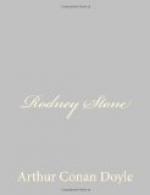The proceedings might have opened by an impromptu bye-battle between the indignant cockney and the gentleman from Bristol, but a prolonged roar of applause broke in upon their altercation. It was caused by the appearance in the ring of Crab Wilson, followed by Dutch Sam and Mendoza carrying the basin, sponge, brandy-bladder, and other badges of their office. As he entered Wilson pulled the canary-yellow handkerchief from his waist, and going to the corner post, he tied it to the top of it, where it remained fluttering in the breeze. He then took a bundle of smaller ribands of the same colour from his seconds, and walking round, he offered them to the noblemen and Corinthians at half-a-guinea apiece as souvenirs of the fight. His brisk trade was only brought to an end by the appearance of Harrison, who climbed in a very leisurely manner over the ropes, as befitted his more mature years and less elastic joints. The yell which greeted him was even more enthusiastic than that which had heralded Wilson, and there was a louder ring of admiration in it, for the crowd had already had their opportunity of seeing Wilson’s physique, whilst Harrison’s was a surprise to them.
I had often looked upon the mighty arms and neck of the smith, but I had never before seen him stripped to the waist, or understood the marvellous symmetry of development which had made him in his youth the favourite model of the London sculptors. There was none of that white sleek skin and shimmering play of sinew which made Wilson a beautiful picture, but in its stead there was a rugged grandeur of knotted and tangled muscle, as though the roots of some old tree were writhing from breast to shoulder, and from shoulder to elbow. Even in repose the sun threw shadows from the curves of his skin, but when he exerted himself every muscle bunched itself up, distinct and hard, breaking his whole trunk into gnarled knots of sinew. His skin, on face and body, was darker and harsher than that of his youthful antagonist, but he looked tougher and harder, an effect which was increased by the sombre colour of his stockings and breeches. He entered the ring, sucking a lemon, with Jim Belcher and Caleb Baldwin, the coster, at his heels. Strolling across to the post, he tied his blue bird’s-eye handkerchief over the west-countryman’s yellow, and then walked to his opponent with his hand out.
“I hope I see you well, Wilson,” said he.
“Pretty tidy, I thank you,” answered the other. “We’ll speak to each other in a different vashion, I ’spects, afore we part.”
“But no ill-feeling,” said the smith, and the two fighting men grinned at each other as they took their own corners.
“May I ask, Mr. Referee, whether these two men have been weighed?” asked Sir Lothian Hume, standing up in the outer ring.
“Their weight has just been taken under my supervision, sir,” answered Mr. Craven. “Your man brought the scale down at thirteen-three, and Harrison at thirteen-eight.”




